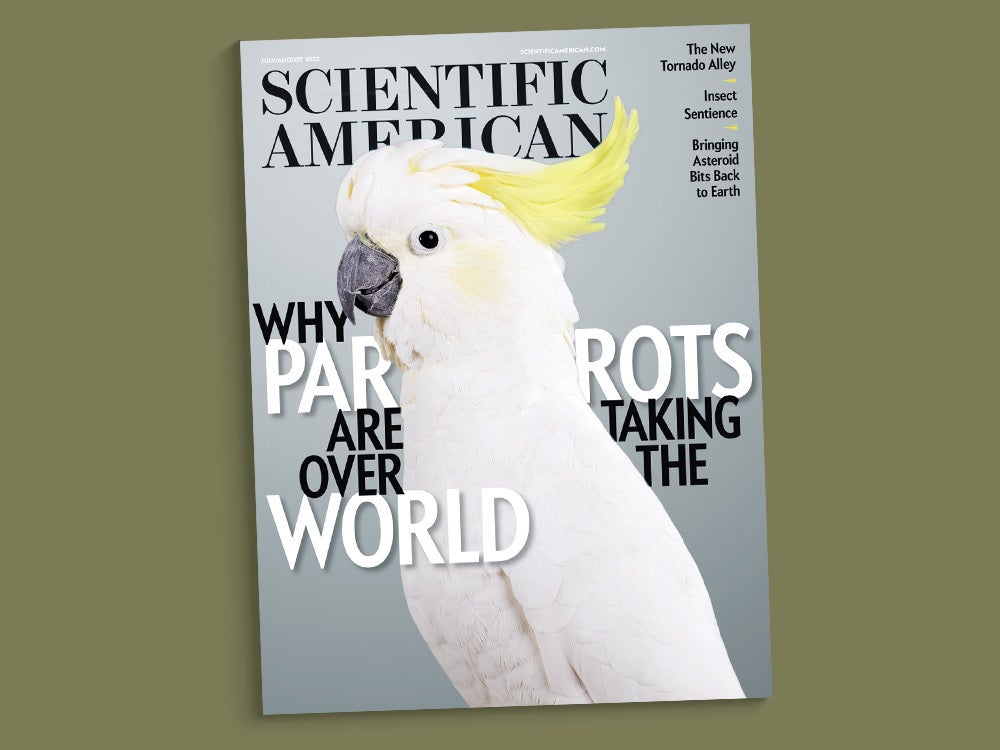
Have you ever seen a parrot in a strange place? If you hear a flock of squawky, large and colorful birds and wonder if you’re seeing things, you’re not. Various species of parrots have escaped from the pet trade and have established thriving colonies in cities around the world—Sarasota, Fla.; New York City; Surprise, Ariz.; Singapore; Amsterdam; Tel Aviv—they’re everywhere. It’s hard not to anthropomorphize. As science writer Ryan F. Mandelbaum explains, they’re smart, social, adaptable and assertive. They eat anything and breed anywhere. They’re basically us with wings.
We’re eagerly awaiting the return of NASA’s OSIRIS-REx spacecraft in September. If all goes well, it will release its sample canister to blaze through the atmosphere, open a parachute and land in Utah carrying a scoop of material from the asteroid Bennu. Our space and physics editor Clara Moskowitz narrates how the seven-year mission has progressed and what to expect next.
Scientists are finding treasure under the seafloor—unexpected, widespread aquifers of fresh water off coastlines worldwide. As coastal populations grow and stress existing water supplies, these deposits could be a good source of drinkable water. Geophysicist Rob L. Evans shares how he helped to identify these aquifers and what we know about them so far.
Deadly tornado clusters are becoming more common in the U.S., and Tornado Alley is moving eastward. Our sustainability editor Mark Fischetti, with graphics by Matthew Twombly and a map by Daniel P. Huffman, shows us how, where and why tornadoes form and who is most at risk.
When you feel “in sync” with someone, that may reflect literal synchronized patterns in your brains. A new field of collective neuroscience is finding surprising similarities in people’s brains as they interact, especially in pairs who have a close relationship or between effective teachers and their students. Our Science of Health columnist and contributing editor Lydia Denworth participated in a brain-scanning experiment to find out more.
We’ll probably never know exactly how the COVID-causing virus SARS-CoV-2 began circulating among people, but our health editor Tanya Lewis recaps the evidence for the leading theory—a spillover from an infected animal, possibly in a Wuhan market in China—as well as the possibility of a lab leak.
What’s it like to be a bee? Researchers have found that some insects are surprisingly intelligent. They can count, learn and teach, even feel pleasure and pain. Behavioral ecologist Lars Chittka explores the implications of these intriguing discoveries.
Extreme heat events are the deadliest weather-related disasters in the U.S., but we tend to underestimate the risk. Researcher Terri Adams-Fuller is experimenting with ways to warn and protect people, especially in urban heat island environments where temperatures rise much higher than in the suburbs.
In a delightful history of how ice inspired the modern cocktail, Amy Brady, our Reviews editor, describes how bartenders are now trying to change how they make and use ice. We hope you can read the article sipping a refreshing cocktail or mocktail. And please enjoy this extra-long summer issue for July and August. Good luck staying cool and hydrated!
Stay connected with us on social media platform for instant update click here to join our Twitter, & Facebook
We are now on Telegram. Click here to join our channel (@TechiUpdate) and stay updated with the latest Technology headlines.
For all the latest For News Update Click Here
